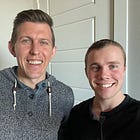
When I was in high school, I remember telling my parents: “I wish I could get paid to read books.” Years later, I now see how this is possible. I can get paid to chase my own curiosity and help other people. How though?
Let’s start with a prophecy that Marshall McLuhan, the father of media studies, made in his 1964 book Understanding Media:
“Energy and production now tend to fuse with information and learning. Marketing and consumption tend to become one with learning, enlightenment, and the intake of information ... Paid learning is already becoming both the dominant employment and the source of new wealth in our society.”
In the Information Age, wealth is increasingly created with information products. Gone are the days of a group of 57 guys taking the tram or commuting on foot to the factory to assemble a greasy Model T. Now, there’s smaller teams of people—or perhaps even one person—who stitch together information to serve some group of people. This could take the form of coaching people on their nervous system, teaching a writing course on Zoom, or writing a paid Substack newsletter. Sure, physical products and businesses still exist, but people can now create wealth by solving some problem using their computers and call that work.
Oh yeah, and I didn’t even mention that co-workers may not even live in the same city and can theoretically do their job in their underwear. Instead of sweatshops and stuffy factories and crowded corporate McBureaucracies, we’re moving towards a world of Cognitive Capitalism.
Paid Learning
I learned this last year when I had the fortune of working with a writer named
. Months after reading Paul’s book The Pathless Path, I sent him a DM on Twitter asking him if he needed help with anything. He did. Although I wasn’t making a full-time income, I was still getting paid to help him with reading and research. This is nuts.What’s even weirder is that I never met Paul before we started working together. At the time, I was still living in my parent’s basement in Colorado after dropping out of college. Our only meeting was a Google Meet call while he was traveling in Barcelona. The office I worked in was the wobbly wooden table at a local coffee shop. For one project, I listened to all of his podcasts from the past two years and thematically sorted them. He always started every interview with one question: “What stories and scripts surrounding work did you grow up with?” My job was to sort these answers in a Google Doc. He ended up using some of that stuff in his new book, Good Work.
For other projects, I read articles, consumed specific content, and helped him sort ideas that were worth keeping. At times, it was tedious, but still, I was basically getting paid for my judgment and enthusiasm about ideas. And although the job of a research assistant is only a relatively recent invention, I have seen and heard that people are paid handsomely for just out-curiousing other people. Sure, ChatGPT can find you any quote you want, but I have a hunch that there’s this intuitive, irreplaceable bodily feeling of taste. The sort of spark inside of you that’s like, this idea is awesome and you need to double down on it.
Reach Out
Science fiction writers will tell you that it’s hard to predict the future; so instead of doing that, they tend to extrapolate something about the time they write from. It makes sense that the future of work and education will be online because it’s already happening right now. As the cyberpunk writer William Gibson wrote, “The future is already here—it’s just not evenly distributed.” Most of my friends work online. Some are coaches. Some are salesman. Some are writers. Sure, I might be self-selecting, but just think of all the people who couldn’t do their jobs without some kind of software. Or think about all the people who are pissed off that their jobs are going back in-person when they know that they can work from home.
So it seems to be true: nowadays, it is possible to educate yourself and make money without leaving your living room.1 While obviously digital technology and remote work has its own set of symptoms that require reverse treatment—like time outside, exercise, posture corrections, walking, stretching, and community, to name a few—knowing all of this is useful to me because I’ve now seen that credentials are starting to be seen as a crapshoot.
As James Dale Davidson and William Rees-Mogg predicted in their 1997 book The Sovereign Individual:
“Merit, wherever it arises, will be rewarded as never before. In an environment where the greatest source of wealth will be the ideas you have in your head rather than physical capital alone, anyone who thinks clearly will potentially be rich.”
Now, we’re living in a global meritocracy where anyone can get an information advantage. In the information age, work is increasingly less associated with commuting to an office building. We no longer think of communication as having anything to do with letters, roads, cars, and bridges. The messenger and the message reunite to one entity, like in oral societies. With less physical jobs and physical products and even physical cash money, life has been devoured by code. Exchanges of value happen less via handshakes and more from the typing of fingers on a keyboard and talking to other people on the phone.2
In the past, I wouldn’t have been able to work with Paul unless I ran into him in Austin. In the past, when it came to meeting mentors and employers, your luck was totally tied to the city you lived in and the people you knew who went to the same Costco, college, or church that you did. There was no such thing as an online network or Internet friend that you could meet by sending a tiny text message. Something that’s shocked me over the past two years is that the Internet is a sizzling magnet for intellectually curious geniuses who use it as a tool for good. At this point, I’ve met most of my friends and mentors through Twitter, online courses, and retreats. In fact, I actually wouldn't have heard of or moved to Austin without the Internet.
What I’m trying to say is that there aren’t actually any gatekeepers—or at least, there’s just different gates. If you can find someone’s email and send them a personalized message and do free work for them that you think they’d find valuable, there’s a very good chance they will want to work with you. That’s what I did with Paul. After I sent him free work, he was like, “Wow, this is awesome.” And he also probably thought, “He did great work for me for free. I wonder what he’d do if I paid him.” Plus, if you’re young like me and have ideas, there are older people with capital who want to help you, in large part because your enthusiasm is contagious. Paul told me that for the first paid project we worked on, he sort of just made it up because he appreciated my zest.
As David Perell once said:
“People are disproportionately willing to help young people who are highly curious and are high agency. If you are between 14 and 24 and you have ideas and you are hungry and you are willing to listen and learn and ask good questions, everybody will help you.”
I wrote this essay a call to action for myself to be more ambitious about who I reach out to. Although I’m only 22, I really do believe that I can get or create virtually any job that I want. Sure, I don’t have a degree, but I still have my intellectual curiosity. And I know that if I can do my research thang or even just have a conversation with someone, they will probably pick up on who I am and what I value. Odds are, if it’s the right fit, the flow will find itself, and our mutual excitement and intensity about ideas will be infectious and synergistic.
Have more faith in the Internet. Be clear, be concise, and reach out to whoever inspires you. Figure out how you can help them, and they might help you back. I’m not exaggerating when I say that the last 17 months of my life rests on one crappy cold email. Knowing this, I’ve started to wonder: “What if I asked more? Maybe my opportunities are boundless and I didn’t even know it.”
Links To This Essay
Notes
Paradoxically, I think that in the age of online work, where you live will be more important than ever before. If jobs are increasingly independent of the city you live in, then cities are ultimately about culture, weather, community, and healthy design for humans. In other words, everything that contributes to wholesome rest and leisure away from screens.





I really enjoyed the read this am. I do like the idea of life flexibility, being able to do what you want, where you want and be limitless with what you do🙂. Great piece!!